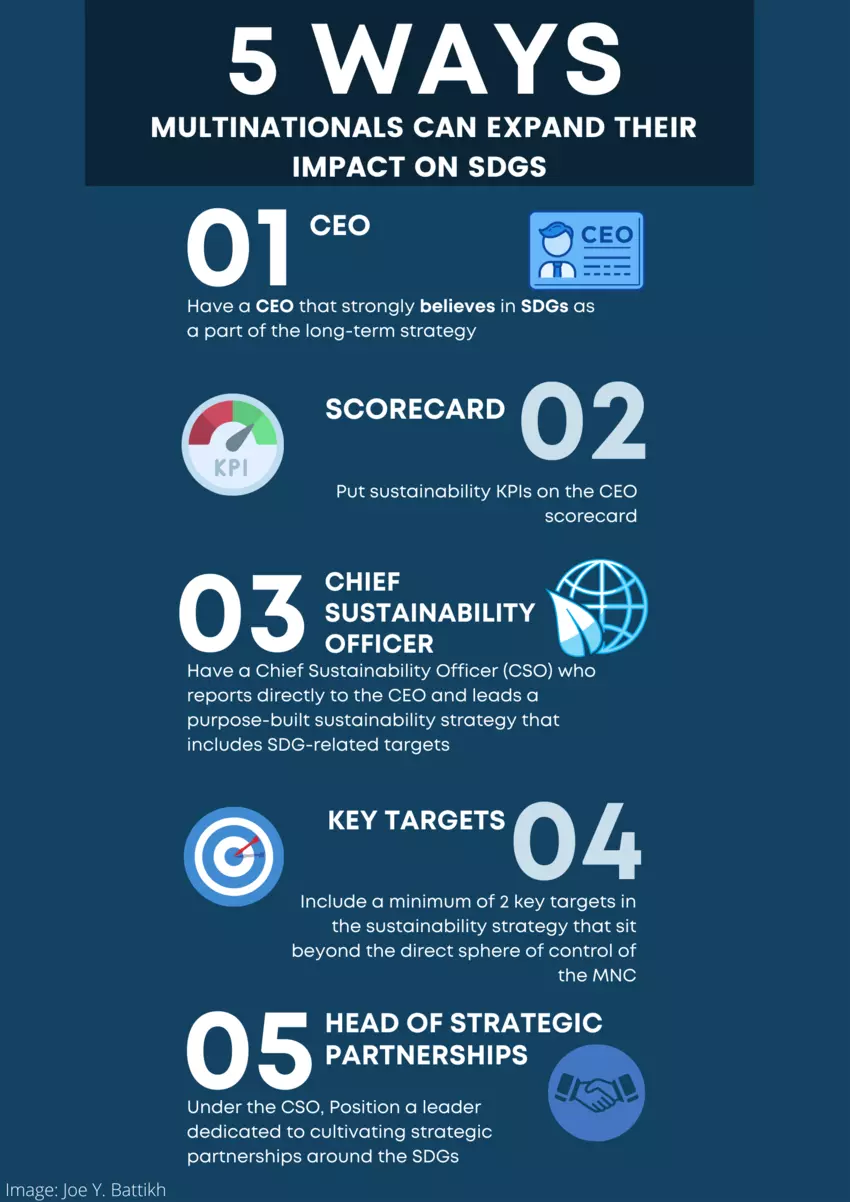5 ways multinational corporations can have a greater impact on the SDGs
- Multinationals need to do more to contribute to achieving the Sustainable Development Goals (SDGs).
- Integrating SDG targets into their core business is good for the corporation and for the world.
- Multinationals can have a greater impact on SDGs with five practical actions.
Most multinational corporations (MNCs) are already using the UN’s 17 Sustainable Development Goals (SDGs) in their sustainability strategies. When we look at publicly traded MNCs on the Fortune Global 500 list from 2019 (399 of 500), we find that 65% (260) refer to SDGs in their sustainability reporting. This suggests a trend towards assuring that MNC practices align more closely with SDG targets.
But it is not enough.
The top 10 publicly traded MNCs in the 2019 Fortune Global 500 list employ more than 4.7 million people and generate more than $3.1 trillion in revenue annually. MNCs have a significant global impact on sustainable development, which is why they were invited to contribute to the design of the SDGs.
However, their role in the application of the SDGs remains unfulfilled, which is unfortunate given that sustainable development depends on how MNCs behave in their global practices.
“There is no doubt that MNCs must be part of the solution for a collective achievement across the five SDG principles: people, prosperity, planet, peace and partnerships.”
—Joe Y. Battikh, University of Waterloo
The involvement of MNCs needs to evolve into a workable model of strategic multi-stakeholder partnerships integrating SDG targets within their core business so it is advantageous to both the MNCs and the world. Responsible business practices are not just a question of doing good for the planet, but of corporate survival, as investors and consumers are making decisions in favor of sustainability-focused companies.
Some MNCs have already taken on this challenge, forming global partnerships across sectors. Engie is an example of a multinational utility company whose 10-year project with support from Engie Foundation, Energy Assistance France and Friendship has brought the first solar village in Bangladesh. Through long-term multi-stakeholder partnerships, Engie has achieved its mission of bringing sustainable solar energy to the villagers (SDG7). Interestingly, they found their model had extended positive impact on student school performance (SDG4). With even greater outreach to other partners, Engie is primed to extend even further and contribute to employment access (SDG8) and poverty reduction (SDG1).
So, who else can help? And how will decision-makers find common ground to move forward? Here are 5 ways multinationals can expand their impact on the SDGs.

1. Have a CEO who strongly believes in SDGs as a part of the long-term strategy.
The Decade of Action demands that leaders at the helm of the most globally influential companies adopt the SDGs holistically. Only 21% of CEOs report a contribution to the delivery of the SDGs but 70% of them agree that it should be done. We need CEOs whose actions align with their convictions – especially when there is potentially around $12 trillion in annual private business opportunities by 2030 and more than 350 million new jobs at stake.
2. Put sustainability KPIs on the CEO scorecard.
We cannot simply hope for visionary CEOs. Corporate governance can assure effective sustainability practices by attaching relevant KPIs to a CEO’s scorecard. As such, CEOs will be more inclined to embrace that commitment as they deliver value to their stakeholders without making shortcut gains for the next quarter.
Paul Polman turned Unilever around by acting on his conviction that “the SDGs provide the world’s long-term business plan by putting people and the planet first.” Ten years after launching the Unilever Sustainable Living Plan, the Sustainable Living Brands accounted for delivering 75% of the company’s growth.
3. Have a Chief Sustainability Officer (CSO) who reports directly to the CEO and leads a purpose-built sustainability strategy that includes SDG-related targets.
Assuring the C-suite is fully committed to implementing the SDGs will help avoid SDG-washing. This starts with ensuring the SDGs are not the responsibility of various smaller departments (e.g. marketing, operations, HR), as stated in a recent study looking at gaps in the implementation of the SDGs.
4. Include a minimum of two key targets beyond the direct sphere of control of the MNC.
The purpose here is to avoid a narrow adoption of the SDGs that permit “business as usual” – also known as “cherry-picking”. For MNCs to engage in a Decade of Action, they need to develop strategies beyond their direct sphere of control for responsible business practices that support the greatest impact. We already know this is worth the investment; we just need CEOs who know how to get it done.
5. Under the CSO, position a leader dedicated to cultivating strategic partnerships.
Transformative change will only be achieved when we work across industries and sectors. The World Economic Forum affords a global opportunity for governments and business to cultivate impactful partnerships to drive the SDG agenda. Yet, the challenge of operationalizing complex partnerships has limited private-sector uptake when it comes to addressing the SDGs at various levels. A leader responsible for supporting the MNC’s sustainability strategy should be dedicated to creating complex partnerships with stakeholders that stretch beyond a narrow sphere of influence.
Dr. Sonia Ben Jaafar, Chief Executive Officer, Abdulla Al Ghurair Foundation for Education
Joe Y. Battikh, PhD Candidate, Sustainability Management Faculty of Environment, School of Environment, Enterprise and Development (SEED), University of Waterloo
“Originally published at World Economic Forum’’



